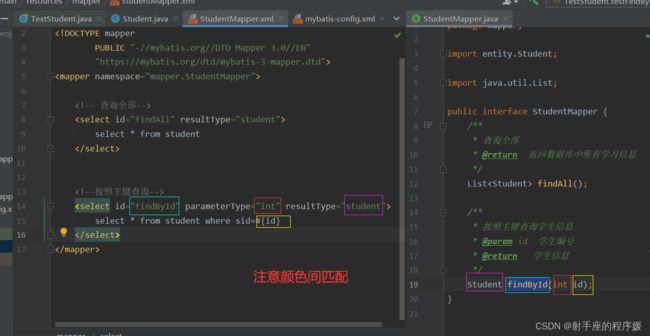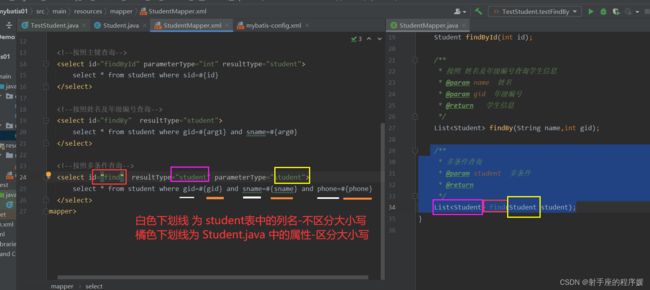Mybatis3系列课程8-带参数查询
简介
上节课内容中讲解了查询全部, 不需要带条件查, 这节我们讲讲 带条件查询
目标
1. 带一个条件查询-基本数据类型
2.带两个条件查询-连个基本数据类型
3.带一个对象类型查询
为了实现目标, 我们要实现 按照主键 查询某个学生信息, 按照姓名和年级编号查询学生信息
按照学生部分信息查询完整信息
实现步骤
按照主键查询学生信息
主键是唯一的,如果按照主键查, 最多查询到一位同学信息
修改 StudentMapper.java 增加以下代码
/**
* 按照主键查询学生信息
* @param id 学生编号
* @return 学生信息
*/
Student findById(int id);修改StudentMapper.xml增加 select
一个参数查询的说明:
select 标签的id 属性值 对应 接口中 方法的名字
parameterType 对应 接口中 参数的类型
resultType 对应 接口中的返回值类型
一个参数的查询, 在mybatis中 可以使用 #{任意字符} 来获取,
但 为了与接口一致, 一般使用接口中参数的名字来代替 即 #{参数名}
测试 代码
import entity.Student;
import mapper.StudentMapper;
import org.apache.ibatis.io.Resources;
import org.apache.ibatis.session.SqlSession;
import org.apache.ibatis.session.SqlSessionFactory;
import org.apache.ibatis.session.SqlSessionFactoryBuilder;
import org.junit.Before;
import org.junit.Test;
import java.io.IOException;
import java.io.InputStream;
import java.util.List;
public class TestStudent {
private SqlSessionFactory sqlSessionFactory;
@Before
public void init() throws IOException {
// mybatis 配置文件的文件名
String resource = "mybatis-config.xml";
InputStream inputStream = Resources.getResourceAsStream(resource);
sqlSessionFactory = new SqlSessionFactoryBuilder().build(inputStream);
}
@Test
public void testFindAll() throws IOException {
//获得SqlSession
SqlSession session = sqlSessionFactory.openSession();
StudentMapper mapper = session.getMapper(StudentMapper.class);
List list = mapper.findAll();
list.forEach((e)->System.out.println(e));
}
@Test
public void testFindById(){
//获得SqlSession
SqlSession session = sqlSessionFactory.openSession();
StudentMapper mapper = session.getMapper(StudentMapper.class);
Student student = mapper.findById(2);
System.out.println(student);
}
}
运行结果
按照姓名和年级编号查询学生信息
按照姓名和年级编号查, 可以查询多个学生信息, (一个年级中可以出现同名学生)
修改StudentMapper.java 增加
/**
* 按照 姓名及年级编号查询学生信息
* @param name 姓名
* @param gid 年级编号
* @return 学生信息
*/
List findBy(String name,int gid); 修改StudentMapper.xml 增加 select 标签
编写测试类
@Test
public void testFindBy() throws IOException {
//获得SqlSession
SqlSession session = sqlSessionFactory.openSession();
StudentMapper mapper = session.getMapper(StudentMapper.class);
List list = mapper.findBy("王凯",7);
list.forEach((e)->System.out.println(e));
} 结果如下
使用 arg0 测试
两个参数总结:
对应 select标签id的值 对应 接口中 方法名
不需要配置 paramterType
通过 #{arg0}或#{param1} 引用获得第一个参数
通过 #{arg1}或#{param2} 引用获得第二个参数, 以此类推
按照多条件查询学生信息
多条件查询 一般推荐 参数使用 实体类本身
修改StudentMapper.java 增加
/**
* 多条件查询
* @param student 多条件
* @return
*/
List find(Student student); 修改StudentMapper.xml 增加
@Test
public void testFind() throws IOException {
//获得SqlSession
SqlSession session = sqlSessionFactory.openSession();
StudentMapper mapper = session.getMapper(StudentMapper.class);
Student stu = new Student();
stu.setPhone("13852615963");
stu.setSname("王凯");
stu.setGid(7);
List list = mapper.find(stu);
list.forEach((e)->System.out.println(e));
} 总结:
使用对象类型作为参数
#{属性名} , 要注意 属性名区分大小写
本文只是为了 讲解 接口中方法参数的写法,
例如像 电话,姓名应该用模糊查询写法, 本文目前先不涉及,后续更新模糊查询





